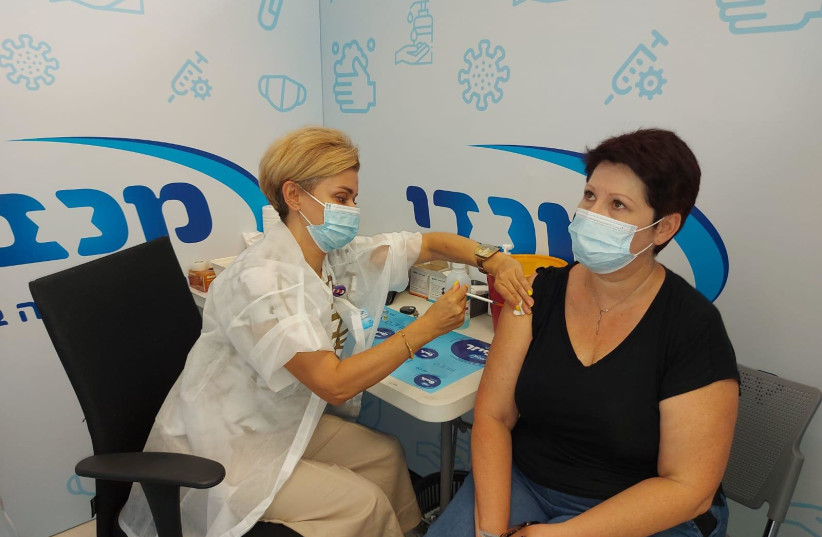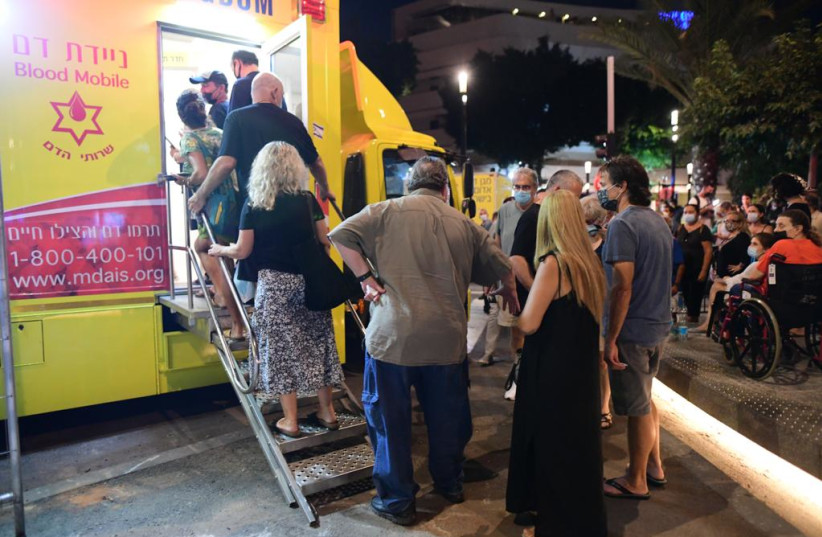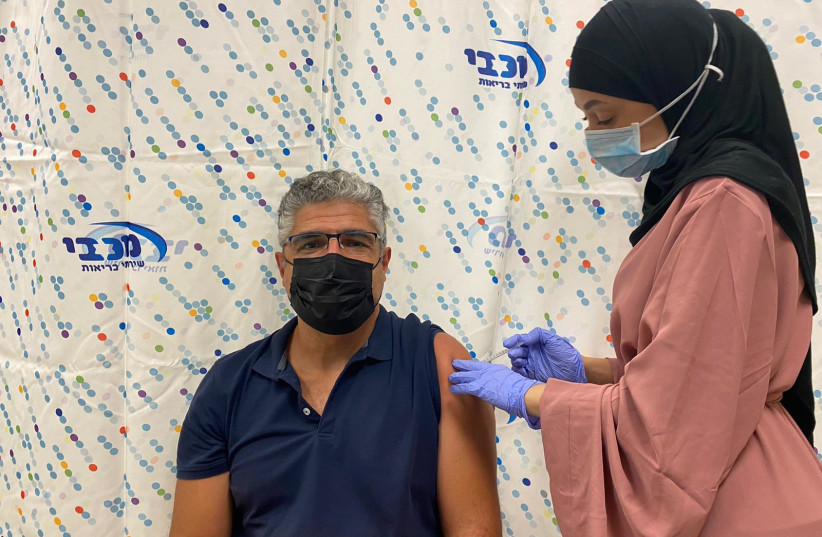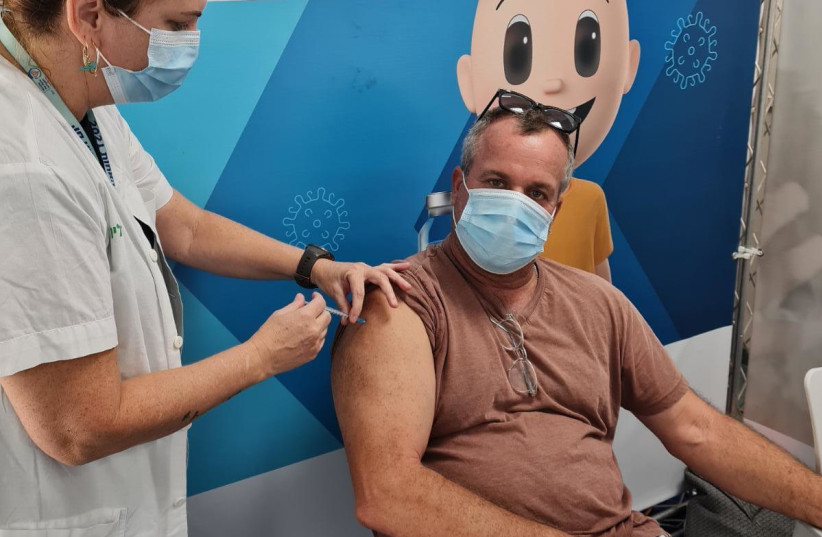Health Minister Nitzan Horowitz says beating coronavirus is “in the hands and ‘shoulders’ of every person.”

(photo credit: MACCABI HEALTHCARE SERVICES SPOKESPERSON)
The country is planning to vaccinate 24 hours a day, seven days a week, as per Prime Minister Naftali Bennett’s instructions, in an attempt to stop the surge in coronavirus cases.
Health officials are predicting that the number of patients hospitalized with the virus will double every 10 days, hitting as many as 4,800 – 2,400 serious – patients by September 10. The highest number of serious patients until now was around 1,200 – a number Israel hit in January 2020.
There were 5,868 people diagnosed with coronavirus on Friday, the Health Ministry reported Saturday night. The number of serious cases stood at 494. Some 4.93% of the people screened had a positive result.
Although no official results have yet to be shared by the Health Ministry, N12 reported Saturday night that there were 5,867 new cases of the virus and that serious patients had risen to 492.
Hospitals are starting to feel the challenge of treating so many patients, especially in central Israel where at least two smaller hospitals – Kaplan Medical Center in Rehovot and Shamir Medical Center in Tzrifin-Be’er Ya’acov – were forced to reroute patients to other hospitals.
Hadassah-University Medical Center in Jerusalem, which is operating one COVID-19 internal medicine ward and one COVID-19 intensive care unit, said it was increasing staffing to assist with the absorption of patients from other hospitals in the country.
“This is a life-saving effort that aims to protect public health,” the prime minister stressed Friday, after speaking to the CEOs of the country’s four health funds and instructing them to double their vaccination rates this week with the aid of IDF medics, an agreement Bennett made with Defense Minister Benny Gantz.
Magen David Adom set up vaccination caravans at Dizengoff Square in Tel Aviv on Saturday night from 8 p.m. to 4 a.m. to allow people hanging out there to get their first, second or third shot. Scenes from the square showed lines of hundreds of people eager to be vaccinated.
There were also around 1,000 people who turned out to protest the vaccination campaign, carrying signs that read, “This is not a vaccine! The shot is dangerous” and “golden calf.”
However, Bennett said that due to the crowd that turned out Saturday night to get vaccinated in Tel Aviv, he ordered the opening of similar vaccination stations in 10 other major cities from Sunday to Tuesday.

The country kicked off the first day of its second booster or third shot campaign for people over the age of 50 on Friday, with health funds reporting that more than 37,000 Israelis in this age cohort were already vaccinated over the weekend and roughly 100,000 others had already made appointments to get the jab.
So far, more than 5.8 million Israelis have had at least one shot of the vaccine, 5.4 million two shots and around 845,000 three shots.
THE FIRST-IN-THE-WORLD decision to offer another shot to this population was made late Thursday night following a lengthy meeting by the Advisory Committee for the Corona Vaccines and Epidemic Control.
The Health Ministry also approved shots for healthcare workers over the age of 30 who work with coronavirus patients and prisoners and wardens over the age of 40, as long as it has been at least five months since they received their second vaccine.
“Members of the team worked diligently, professionally and thoroughly, and reached the conclusion that the third inoculation for people aged 50 and over, and for medical teams, is effective and correct,” Bennett said in a statement following the decision.

Health Minister Nitzan Horowitz got his third shot at Meir Medical Center in Kfar Saba on Friday afternoon, where he stressed that the decision to approve the booster was based on “medical and scientific recommendations.”
He said that there is an indication that the ability of the body to ward off infection and serious disease from the Delta variant goes up “dramatically” after the shot.
A total of 36% more individuals over the age of 65 who are immunosuppressed developed antibodies after receiving a third shot of the Pfizer coronavirus vaccine than after getting the second shot, according to a study released Friday by Tel Aviv Sourasky Medical Center.
The study was conducted among 240 immunosuppressed patients.
According to the researchers, only 25% of organ transplant patients had an antibody response to the vaccine after their first and second doses. After a third vaccine, some 50% responded.
Similarly, among hematologic patients, one-third more patients responded to the third versus the second dose.
In general, for those under the age of 65, there was a 70% response rate compared to a 27% response rate after the second shot. And, for those over 65, some 43% developed antibodies compared to 7% post-second dose.
“From studies we conducted, we saw that the chances of those who were vaccinated in January being infected with coronavirus are twice as high as those who were vaccinated in April,” explained Maccabi CEO Sigal Dadon Levi. “The level of protection decreases over time, so it is very important to get the third dose.”
Last week, Clalit Health Services reported that 88% of people who received the third shot of the coronavirus vaccine said they felt “similar” or “better” compared to how they felt in the days following receiving the second vaccine. The report was based on data the fund captured from some 4,500 people over 60 out of the 240,000 of their members who received the third shot at the time.
But on Friday night, a 52-year-old woman was hospitalized in the intensive care unit at Ziv Medical Center in Safed after what appears to be an allergic reaction to receiving the third dose of the Pfizer coronavirus vaccine, the Health Ministry reported. She was in serious but stable condition.
The ministry said it was still examining the details of the case, adding that allergic reactions to vaccines, although rare, are familiar and that those who develop an allergic reaction to taking any shot of the vaccine are advised to consult their doctor before receiving any subsequent doses.

HOROWITZ said that Israel is in a race against the virus and the most effective way to stop its spread is to vaccinate. He described a “triangle” or three-pronged effort for combating COVID: restrictions, such as the Green Pass program and masks; vaccination; and investing in beefing up the health system with more medical and support staff to be able to manage the growing number of serious patients.
He said that a High Holy Day lockdown is a “last resort” and that it is “not a successful solution” to the pandemic.
“It is in the hands and ‘shoulders’ of every person,” Horowitz said.
He added during the question-and-answer session that children will be vaccinated in schools against the virus, despite opposition by Education Minister Yifat Shasha-Biton.
“At the start of the school year we will be vaccinating in schools,” Horowitz said. “Any head of a local authority or institution who wants one will receive a mobile [vaccination] unit.”
Public Security Minister Omer Bar Lev said during a Tel Aviv Shabbat culture event over the weekend that he had recommended that schools delay opening until October 1, after the High Holidays, during the previous coronavirus cabinet meeting.
“The cabinet has not accepted my recommendation yet, but my assumption is that just like with the Green Pass, where I called on the cabinet to act two weeks before it actually did, in this case my recommendation will eventually be accepted,” he said.
In response to Bar Lev’s statements, Shasha-Biton assured the public that school will start on time “out of concern for students’ mental well-being” and in a “safe and controlled manner.”
Israel was expected to receive another 500,000 doses of the Pfizer vaccine overnight Saturday, N12 reported, to enable its continuous vaccination campaign.
“Together with the Health Ministry, we have brought a great quantity of vaccines to Israel in order to facilitate quick action in vaccinating the public and protecting it from the Delta strain,” Bennett said. “Go get vaccinated. This is a great success. It is in our hands.”
As reported by The Jerusalem Post
